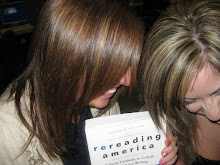Wednesday, February 25, 2009
Incomplete sentences. It's a problem i admit i may have.
http://www.pvc.maricopa.edu/lsc/faq/eng/enggraer.htm
Wednesday, February 18, 2009
10 tips for keeping writing professional?
Just a few fun things to check over before completing a paper.
#1: Plan your writing
Before you actually start to write, put some thought into what you’re going to write. First, determine your purpose and your primary audience. Decide what information you need to give your audience — and what information you don’t. Figure out the best way to convey your message. Focus on being objective and convincing so that your message appeals to both the receptive and resistant members of your audience.
#2: Do your homework
Research your topic so that you aren’t just relying on opinion. Collect and analyze data. Incorporate visual aids (charts, graphs, tables, photos, etc.) when appropriate.
#3: Write drafts
Don’t expect perfection in the beginning. In fact, your final product will be much better if you start by cranking out a crappy first draft. As writer Anne Lamott observed, “All good writers write them. This is how they end up with good second drafts and terrific third drafts.” Concentrate on the content of the writing, and be sure — above all — that it is accurate.
#4: Revise for style, correct grammar, and spelling
Writers who fail at this step lose credibility with their readers. Buy a good grammar handbook and dictionary and use them whenever you’re unsure about punctuation and spelling
#5: Choose effective wording
Use language that is concise and familiar rather than verbose and academic.
Examples:
Use, not utilize; shortage, not paucity. Avoid clichés, slang, and buzzwords.
#6: Watch out for commonly confused words and phrases
Many words are easily mixed up, such as:
- accept/except
- advice/advise
- affect/effect
- its/it’s
- lay/lie
- passed/past
- personal/personnel
- moral/morale
- sit/set
- real/really
- your/you’re
- their/they’re
- theirs/there’s
Learn to use these words correctly and double-check to make sure the wrong form doesn’t get by you.
#7: Be precise
Use specific, concrete words.
Examples:
Three, not several; boat or car, not vehicle. Watch out for words such as recently, substantial, a few, and a lot. Try to be more exact. Give your reader a specific mental picture of what you mean.
#8: Write concisely
Businesspeople are too busy for wordy writing. Keep your reports, memos, and other business documents as brief and clear as possible.
#9: Avoid redundancy
Many repetitive phrases can be tightened into one word.
Examples:
History, not past history; plan, not plan ahead; sum or total, not sum total, to, not in order to.
#10: Vary your sentence structure
Mix up simple, compound, and complex sentences. Use both short and long sentences to keep your writing interesting.
etc.. http://blogs.techrepublic.com.com/10things/?p=110
Moving beyond our argumental culture
I enjoyed reading the section, Believing as Thinking; It went well with our lesson in class last week, when we dealt with the court case. By having us split into groups and tell us what part of the case we were for or against begun to open up ways for us to play the believing game. We had to use different methods to come up with ideas and facts that supported the case we were arguing. I agree with Tannen, she explains in a more in depth manner that we do shut out ideas or arguments that we don't agree with. We sometimes tend to be hard headed and not see all sides or points of views to an argument.
Wednesday, February 11, 2009
Compound Sentences.
A compound sentence has two independent clauses joined by either a coordinating conjunction, conjunctive adverb, or a semicolon. This site explained that. Click here,
"I wanna be average" By Mike Rose
The author illustrates that, " Bullshit, of course, is everything you -and the others- fear is beyond you: essay, tests, academic scrambling, complexity, etc. This comes as a strong statement. The use of logos stands out. By capturing one's attention and trying to get the logic out of what we might consider minute tasks.
"Membership on the track team covered me." This statement illustrates to me a confident luxury he feels he had. Not having to worry about classes you felt you were not interested in. It is still hard for me to grasp the fact that we have a school system set up this way. Education is excellent, but required on certain subjects is disagreeable with in my personal opinion. Through the use of pathos,the author does an excellent job at describing his fathers condition. At any age its hard to to witness family and elders age.
I could not help but laugh when he describes how he had no idea what "entrance requirements" were. That's pretty much how i felt on graduation day. I knew college was a must and i would make it there when i was ready. He really shows a lot of joy, and enhances the use of pathos to express his excitement when he realizes with MacFarlands help he can make college a reality.
Wednesday, February 4, 2009
That vs.Who vs. Which
http://www.grammarbook.com/grammar/whoVwhVt.asp
